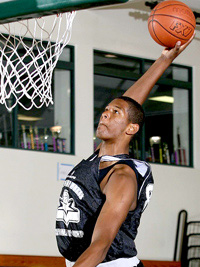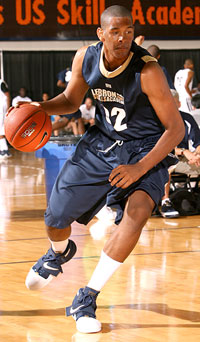One giant leap for Tyler
By Dan Wetzel
Jeremy Tyler has decided to forgo his senior year of high school and turn pro.
Yes, high school.
This isn’t some sign of the sporting apocalypse or a teenager with an overvalued sense of worth. It’s a daring, trailblazing yet well-thought-out move that challenges the bizarre way America develops amateur basketball players.
Tyler is an agile 6-11, 260-pound San Diego native, the nation’s top player in the junior class who already committed to the University of Louisville. He’s as close to a can’t-miss NBA prospect as there is; a tantalizing mix of size, speed and smarts. Scouts project him to be the No. 1 pick in the 2011 draft, when he’s eligible under the NBA’s age requirements.
In the meantime, Jeremy Tyler’s options were to:
1. Spend the next year at his local school, San Diego High, where he faces quadruple teams and isn’t experiencing much development; or
2. Transfer to a basketball factory in some rural outpost back East which has a big-time team but resembles a traditional high school in name only; and then
3. Play college ball for a few months dealing with NCAA limitations on practice time and coaching contact while competing against many of the same guys he has the last few years.
All for free, of course.

“I know I can do great things with my talent. My goal in life is to get better. Playing with the pro guys will get me a lot better faster. It will help me fulfill my dreams of playing in the NBA.”
– Jeremy Tyler
Instead Jeremy and his father, James, who owns his own home improvement company and is about to open a family restaurant, surveyed the traditional route, decided it made little sense, and went looking for a new plan. They called retired sneaker executive and hoops dealmaker Sonny Vaccaro and plotted a course for Europe.
It isn’t the easy way – hanging out in high school, AAU and college is safer and far less demanding – but it is what they believe will be the best way to prepare for the NBA. It’s exactly what a teenager of comparable talent would do if they were pursuing a career in music, acting, tennis, hockey or even academics.
“It may not be the best way to get to the NBA, but it’s the best way to get ready for the NBA,” Jeremy Tyler told Yahoo! Sports this week. His decision was first reported by the New York Times.
“I know I can do great things with my talent,” Tyler continued. “My goal in life is to get better. Playing with the pro guys will get me a lot better faster. It will help me fulfill my dreams of playing in the NBA.”
Over the next couple of weeks the Tylers said they will hire a financial planner and professional sports agent and pursue early feelers from professional teams in Spain, Italy and Israel. Jeremy Tyler is likely to receive a contract worth at least a few hundred thousand dollars a year and could sign endorsement contracts worth at least that.
The plan is to live abroad the next two years, with his father and an uncle taking turns staying with him. “He’ll never be alone,” James said.
Tyler will play against the grown men who can challenge a player of his size and potential. Away from the court he’ll be home-schooled, earn a GED and return in two seasons when he’s eligible for the 2011 draft.
By then, Jeremy Tyler figures, he’ll be a much better player and person; having learned from top coaches, enjoyed unlimited practice time and broadened his horizons in a foreign land. He calls it “a dream job” and isn’t the slightest bit nostalgic for homecoming, prom or missing out on college hoops.
And while he’ll earn a great deal of money, he says his chief motivation is to make himself the best prospect possible for the even greater amount waiting in the NBA.
In basketball terms, it’s a no brainer. The only risk is exposure at the hands of superior competition. Tyler could just stay in the States and hide his weaknesses against smaller, less-talented opponents.
“His game will be picked apart [by scouts], but long-term it’s much better for his development as a player,” said one Western Conference general manager, who can’t comment publicly due to NBA rules. “It’s a bold move, but I’ve seen tape and that kid could play in the NBA right now. He’s an incredible talent.”
Jeremy Tyler said he wants his shortcomings exposed so he can work on them in the same European professional leagues that have produced dozens of NBA players.
This June’s draft will bring more, including Brandon Jennings, a guard from Compton, Calif., who skipped his freshman season of college to play in Italy. Despite predictable challenges on and off the court, Jennings is returning as a projected lottery pick. NBA front offices said they value his experience more than that of a college freshman.
– James Tyler, Jeremy’s father
Then there’s Spain’s 18-year-old Ricky Rubio, expected to be the No. 2 pick in June’s draft. He turned pro at age 14 and at 17 was an Olympic starter holding his own against Team USA.
“For a 14-year-old overseas to be able to make money to play the same sport I’m playing, I think it’s only fair to have the same opportunity,” Jeremy Tyler said. “If you have a talent, you should be able to use it. If college is not going to help you at any stage, it’s a little unfair.”
The college is not going to help you part is where Jeremy, who is polished beyond his years, understands the criticism will come from.
He and his father are bracing for an establishment backlash that fails to appreciate their motivation, determination and appreciation of the intrinsic value of education. They think most of it will be designed to protect the billion-dollar business of amateur basketball.
“It’s just the old way of doing things and no one wants to swallow the pill of change,” James Tyler said. “Basketball is an American sport and they want the kids to go through the channels. And I think there is so much money generated in collegiate sports that they don’t want that interrupted.
“It’s a double standard.”
It won’t help the NCAA if top prospects flee to Europe to develop their games rather than add star power to March Madness.
College hoops was rescued from a long talent drain when in 2005 the NBA enacted an age limit that prohibited American players, but not foreigners, from entering the draft until one year after their high school class graduated.
That has led to a push of young stars in college basketball for one year, even if their commitment to being a “student-athlete” is often dubious. To be eligible for a season, a kid needs to earn just two D’s in the fall semester. He can fail, or not even show up for, every other class his freshman year and drop out immediately after the season.
Jeremy Tyler insists he’s on solid academic ground and isn’t going to Europe to avoid school work. The family informed Cardinals coach Rick Pitino about the decision.
“Education will always be there,” Jeremy said. “It doesn’t matter if I get it now or in three years. I can always go back. I’ll always have that to fall back on. I want to have a degree in business management.”
“Give me the day Harvard is going to close and then I’ll reconsider,” said James, who attended Mississippi Valley State but didn’t graduate. “He can always go back to school. It’s all learning. How is living in Europe not a learning experience?”
Sonny Vaccaro, 69, spent four decades as a powerful sneaker executive and basketball middle man, doing everything from signing Michael Jordan to Nike and Kobe Bryant to adidas, to creating what is now known as national grassroots basketball (high level AAU and high school teams).
He has little patience with college basketball, which after years with an inside view, he calls exploitative and dishonest. As a long-time fighter for player rights, he thinks the NBA’s age limit is criminal.
 Jeremy Tyler at Day 3 of the LeBron James Skills Academy.
Jeremy Tyler at Day 3 of the LeBron James Skills Academy. A year ago he helped Jennings and his mother head to Rome and this winter fielded calls from at least a dozen families who considered doing the same.
That included James Tyler, who watched his man-child of a son get little out of high school ball, where his local school has few good players allowing defenses to descend on Jeremy. He contrasted that with the week Jeremy spent last summer at the Amare Stoudemire big man camp, where he was more aggressive and improved almost by the hour.
“He was bored in high school,” James said. “He said that every game. [He’d] just get the rebound and shoot it back in the hole. I said, ‘we’re wasting this guy’s time. He’s not getting the challenge he deserves.’ As a parent, all you want to see is your kid strive to be his best.”
Rather than choose to send his son off to a diploma mill with a killer basketball team back East – for some reason perfectly acceptable to the establishment – he and his son looked to Europe.
Jennings opened the door to Europe, Vaccaro said. Jeremy Tyler is taking it to the next level.
“I always wanted someone to do this,” Vaccaro said. “It’s amazing to me this kid from San Diego has the guts to do this, to take on all these establishment people like this.”
James Tyler said this isn’t about cashing in on his son. If he wanted to do that, he could’ve accepted under-the-table payments from agents or college coaches.
“Financially we don’t need anything from him. I can provide for him,” James said, before laughing. “And that’s saying something [because] he’s a seven-foot kid that eats a lot.
“If you know Jeremy, you know this kid is going to excel,” James said. “Why would we waste his time holding him back? Kobe [Bryant] was only 17 [when he went pro] and he blossomed. And LeBron [James] blossomed. [Dwight] Howard blossomed. Why not give my son that chance?”
Jeremy hopes others take a look at the European option and consider it. Why mindlessly follow a system designed to enrich and reward everyone but the player?
He said he didn’t set out to be a revolutionary. He is one anyway.
In the future the news of a kid forgoing his senior year of high school might not sound so shocking.
Let's wait and see him on 2011. :)
Source



